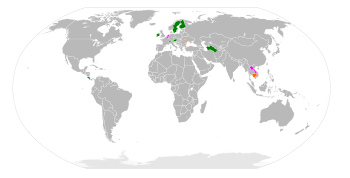- Neutral Powers
-
Neutral Powers refers to those countries which remained neutral during World War II. During World War II, these nations were Ireland, Portugal, Spain, Sweden and Switzerland. These countries had significant land holdings abroad or held substantial economic institutions.
During World War II, these countries took no official side during the war in their hopes to avoid being attacked by the Axis Powers or in becoming involved the aerial attacks of the Axis and Allied Powers. It should especially be noted, however, that Portugal, Sweden and Switzerland all helped the Allied Powers by supplying "voluntary" brigades to Great Britain, while Spain avoided the Allies in favor of the Axis.
Note: Several other countries were neutral until they were invaded, notably Belgium, Norway, the Netherlands, etc.
Contents
Portugal in World War II
In the case of Portugal, over 10,000 men were sent to battle the Germans in Northern France under the banner of Great Britain. The reason for which this occurred was twofold. Firstly, Portugal wanted to continue to maintain its alliance with Great Britain as it had for the last six hundred years (that is, supplying troops in times of need and when invaded by a foreign power). The second reason for which Portuguese soldiers fought under the British flag was because Portugal wanted to help Britain without officially removing itself from a state of declared neutrality. However, Portugal continued trading with countries from both sides of the conflict throughout the war.
Sweden and Switzerland
In the case of Sweden, the Swedish government unofficially sent volunteers to combat the Axis alongside Britain. Finally, Switzerland maintained its neutrality so as to protect its own banking interests from plunder by the Axis. Often, Swiss soldiers opened fire on Axis bombers invading their airspace. On several occasions, Switzerland also shot down Allied planes to appease the Germans. Throughout the war, cities in Switzerland were "accidentally" bombed by both Axis and Allied airplanes. Hitler did indeed plan to invade Switzerland, but Switzerland had formed complex fortifications and amassed tens of thousands of soldiers in the mountains to thwart any Axis invasion. Because of the extreme mountainous conditions in Switzerland, Hitler decided to bombard Great Britain rather than engage in a costly war with Switzerland.
Conclusion
In the cases of all four Neutral Powers, Portugal, Spain, Sweden and Switzerland held to the concept of armed neutrality and continuously amassed soldiers to defend their nation's sovereignty from potential invasion. Thus, they maintained the right to become belligerent if attacked while in a state of neutrality. The concept of neutrality in war is narrowly defined and puts specific constraints on the neutral party in return for the internationally recognized right to remain neutral. A wider concept is that of non-belligerence. The basic international law covering neutral territories is the Second Hague Convention. It is important to note that a neutral country takes no side in a war between other parties, and in return hopes to avoid being attacked by either of them. A neutralist policy aims at neutrality in case of an armed conflict that could involve the party in question. A neutralist is an advocate of neutrality in international affairs. The concept of neutrality in conflicts must be distinguished from that of non-alignment, i.e., the willful desistance from military alliances in order to preserve neutrality in case of war, and perhaps with the hope of preventing a war altogether.
Neutral countries during World War II
The following colonies/countries remained neutral during World War II:
Independent Nations
 Afghanistan
Afghanistan Estonia (Occupied by the Soviet Union in 1940)
Estonia (Occupied by the Soviet Union in 1940) Latvia (Occupied by the Soviet Union in 1940)
Latvia (Occupied by the Soviet Union in 1940) Lithuania (Occupied by the Soviet Union in 1940)
Lithuania (Occupied by the Soviet Union in 1940) North Yemen
North Yemen Ireland
Ireland Portugal
Portugal Spain
Spain Sweden
Sweden Switzerland
Switzerland
Colonies of Portugal
 Angola
Angola Cape Verde
Cape Verde Guinea-Bissau
Guinea-Bissau Macau (currently a Special Administrative Region of China its neutrality was respected by Japan )
Macau (currently a Special Administrative Region of China its neutrality was respected by Japan ) Mozambique
Mozambique Sao Tome and Principe
Sao Tome and Principe Timor Leste (Occupied by Japan from 1942 to 1944)
Timor Leste (Occupied by Japan from 1942 to 1944)
Colony of Spain
Armed neutrality
A country that reserves the right to become a belligerent if attacked by a party to the war is in a condition of armed neutrality.
See also
- Non-belligerent
- Non-Aligned Movement
- Swedish neutrality during World War II
- Irish neutrality
References
- Karsh, E. "Neutrality and Small States." 1989.
- Gabriel, J. M. "The American Conception of Neutrality After 1941." 1989.
- http://www.encyclopedia.com/doc/1E1-neutral.html
External links
Categories:- Laws of war
- International relations
- Neutral states in World War II
Wikimedia Foundation. 2010.

